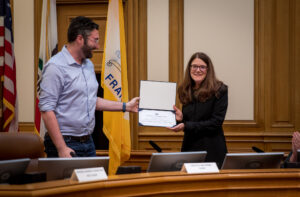Why Being an Exempt Employee is Dangerous
Imagine coming to work one morning, like you’ve been doing for ten years, only to find an HR representative and your manager waiting for you with a letter that says your services aren’t needed anymore. You suddenly need to clean out your desk while under supervision, and leave the job you and your family depend on.
That’s what happened to three Local 21 members recently. Bill Kolarik (Web Designer), Julia Vcherashny (Engineer), and Noriko Tabata (Web Designer) worked for the Department of Technology (DT) with responsibilities such as supporting and designing 130 different City websites, acting as webmasters, making sure websites are section 508 compliant, and working on migrating sites from outdated platforms to more modern platforms in order to make City websites more responsive and interactive.
But one morning without reason or explanation, all three were suddenly dismissed. An HR representative watched them clean out their desks and escorted them out of the building.
“We were treated like criminals,” says Julia, “it was inhumane.” Julia went and sat at a nearby coffee shop while co-workers came by to express their shock and disbelief, and to say their goodbyes through tears.
“They said they couldn’t give me an answer when I asked why,” says Noriko, who along with Bill, says she went home and tried to sort out questions of healthcare and retirement. None of the three had had any problems at work.
When you are an exempt employee, the City doesn’t have to prove that there is anything wrong with your performance at work, because you are considered exempt from Civil Service rules. Many exempt employees are covered under Exempt Category 18, which allows Departments to bypass the Civil Service hiring procedures and make appointments “which shall not exceed 3 years and shall not be renewable,” for the purpose of working on “special projects and professional services with limited term funding.”
Except employees like Bill, Noriko, and Julia were at the Department for 10 years and doing ongoing, regular work like any other employee, not projects with a start and end date. “I had the same work for the decade I was working at DT,” says Noriko. “Our work didn’t just dry up,” says Bill. “I was in the middle of home page redesigns for several departments when I was let go.”
Exempt positions like theirs are being abused across the City, with DT being the worst offender- the Department’s workforce is comprised of a whopping 40% exempt appointments. That means a lot of routine work is being carried out by workers without the job protections they would normally be entitled to under Civil Service.
“I wanted to work for the City because I love San Francisco, and I forwent the salary and perks of the tech sector because I thought a City job came with some job security and a decent pension,” says Bill.
“When I saw the job posting which said that the City was looking for workers to make their websites better, I wanted to be part of that,” says Noriko, a long-term San Francisco resident. “I wanted to make the city more accessible to the public.”
Julia says that she was determined to get a job in the public sector after taking her citizenship test. “I took my oath seriously, and I wanted to give back to the country that had accepted me as one of it’s own,” she says. “I never wanted to do anything else.”
All three feel a sense of betrayal that their years of service have been treated so cavalierly. Julia and Bill were entirely unaware of what the difference between a civil service position and an exempt position could mean, because it was never made clear to them when they were hired. “I was just happy to get the job,” says Bill. Noriko wasn’t informed about the risks of an exempt position upon her hiring either, but she did some research about exempt status, and realized that it put her in a danger. Over the years she asked for opportunities to move to a civil service position many times and was told that there wasn’t the budget for it, and that exempt status was a much better deal for her because she couldn’t get “bumped” by other employees.
All three realize how misleading such statements are now, and advise other Local 21 members to think twice before accepting an exempt position. Says Bill, “You need to be aware of what you are getting into; it’s not the stable job you thought you were getting in the public sector.” Not only are Civil Service rules in place to create a fair, professional hiring process, but employees covered under Civil Service rules and “just cause” provisions of a union contract are protected from random termination. This is a critical function of our unions, becasue it helps make sure workers aren’t fired due to discriination or favoritism. An exempt employee is subject to the whims of their manager, and does not need to go through merit-based hiring proceedures for their job.
The three feel bleak about their futures, because “we aren’t 22 anymore,” and the tech industry is known to be skewed in favor of younger workers.
While there are some extenuating circumstances that make these firings particularly suspicious, and Local 21 is fighting for these workers, they are nevertheless lacking many of the protections they should have had as public servants in the City.
Says Julia, “All I want is to get my work back.”
All Local 21 members should take notice of their stories. Talk to a union Representative/Organizer before accepting an exempt position, and make sure you are well informed about the risks. And stay tuned for more information in our July Cityline about common myths about exempt status.





